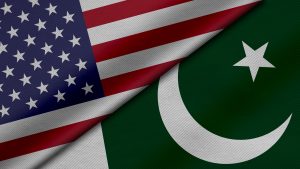The United States has added four leaders from a key anti-Pakistani militant group and its al-Qaida branch to its list of “global terrorists,” triggering sanctions amid a resurgence of militant violence in this Islamic nation.
Both groups operate from Afghanistan, but they have hideouts in Pakistan’s former tribal regions in the northwest and elsewhere as well.
Thursday’s announcement by the State Department comes days after the Tehrik-e-Taliban Pakistan, known as the TTP, ended a months-long ceasefire with Pakistan and resumed attacks across the country.
The threat issued by the TTP forced Pakistani authorities to take additional measures, and security was tight on orders from the Interior Ministry outside worship and other public places Friday amid fears of more attacks. The TTP has asked its fighters to target security forces across the country. Pakistani Taliban were behind the 2014 attack on a Peshawar school that killed 147 people, mostly schoolchildren.
The State Department said that on Wednesday it added four leaders from the TTP and al-Qaida in the Indian Subcontinent (AQIS) to the list of “Specially Designated Global Terrorists.” Both groups have been on the U.S. list of Foreign Terrorist Organizations for years, the TTP since 2010 and AQIS since 2016.
The agency’s statement said the United States is “committed to using its full set of counterterrorism tools to counter the threat posed by terrorist groups operating in Afghanistan, including al-Qa’ida in the Indian Subcontinent (AQIS) and Tehrik-e Taliban Pakistan (TTP)” to keep militants from using Afghanistan as “a platform for international terrorism.”
The four newly designed “global terrorists” include Osama Mehmood, the head of AQIS; Yahya Ghouri, the deputy chief of AQIS; and Muhammad Maruf, who is responsible for recruitment for the group. The fourth is TTP’s deputy leader, Qari Amjad, who oversees militant attacks in northwest Pakistan.
“As a result of these actions,” the statement said, “all property and interests in property of those designated (Thursday) that are subject to U.S. jurisdiction are blocked, and all U.S. persons are generally prohibited from engaging in any transactions with them.”
In a statement, TTP denounced the U.S. measures, describing it as a “sad” announcement. It asked Washington not to interfere in the affairs of other countries. The group said it did not need the use of Afghan soil for attacks in Pakistan, where the TTP claimed it enjoyed the backing of tribal people.
The latest measures by the State Department come days after Pakistan’s new army chief, General Asim Munir, took command of the military amid a spike in militant attacks on security forces and police in the country. He replaced Qamar Javed Bajwa, who retired on November 29 after completing his six-year extended term as the army chief.
One of the key challenges faced by Munir is how to respond to the threat from TTP.
In a statement, Colonel Joe Buccino, spokesman for U.S. Central Command, said CENTCOM chief General Erik Kurilla spoke via video teleconference with Munir to congratulate him on his new position. He said the two leaders discussed Pakistan-U.S. security cooperation efforts and strengthening the bilateral relationship.
There was no immediate comment from Pakistan, but the latest development comes after Islamabad asked the Taliban in Afghanistan to prevent the TTP from using their soil for attacks inside the Islamic nation. The demand from Pakistan came after a suicide bomber dispatched by the TTP blew himself up near a truck carrying police assigned to protect polio workers in Quetta, the capital of southwestern Balochistan province.
The TTP has claimed responsibility for the attack, which has drawn nationwide condemnation.
The TTP emerged after Pakistan became a key ally of the United States in its war on terror after the September, 11, 2001, attacks. The Pakistani Taliban are a separate group but allied with Afghanistan’s Taliban, who have ruled their country since the U.S. and NATO troops withdrew last year. The Taliban takeover in Afghanistan emboldened their Pakistani allies, whose top leaders and fighters are hiding in the next door country.

































